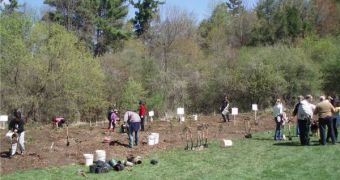Carbon Capture and Storage (CCS) is the generic name given to a variety of technological means through which facilities that burn fossil fuels limit the amount of greenhouse gases they emit into the atmosphere. Ideally, all power plants burning coal, oil or natural gas should have such carbon-trapping devices installed, a move that would significantly reduce their impact on the environment, and allow the atmosphere to regenerate. However, the main problem at this point is that this type of systems is still prohibitively expensive, and that many argue their benefits. To answer these questions, the first such initiative was started in the UK, at the Longannet power station in Fife, the BBC News reports.
The CCS test unit, weighing in at around 30 tonnes, is said to be capable of processing more than 1,000 cubic meters of exhaust gases per hour, and to remove much of the carbon dioxide from it. CO2 is widely looked at in the international community as the main engine behind global warming and climate change. According to the manufacturers of the carbon-trapping machine, it will be able to strip the gas from the exhaust fumes, turn it into liquid, and then prepare it for underground storage. Needless to say, the faith of the entire CCS scheme could depend on the success of this trial run.
The United Kingdom seems determined to act swiftly on counteracting the worldwide threat that is global warming, as it recently gave the green light to a series of projects related to the construction of a new generation of power plants, one that would have their CO2 output drastically limited via legislation, as opposed to existing facilities of the same type.
For the test CCS device, which was devised by Aker Clean Carbon, the scientists behind the initiative went with the post-combustion method of carbon capture, which means that the gas will be stripped from the exhaust fumes after the coal has been burnt, via substances known as amines. In addition to seeing if the system as a whole works, investigators will also have a chance to assess the effectiveness of amines in removing carbon from another gas.
“We believe that the UK can lead the world with CCS technology, creating new skills, jobs and opportunities for growth. There is the potential to create an industry on the same scale as North Sea Oil, and we will invest in Scotland and the UK to help to realize this potential,” Ignacio Galan, the chairman of Iberdrola, said. This is the parent company for ScottishPower, the enterprise that set up the CCS test trials in Fife.

 14 DAY TRIAL //
14 DAY TRIAL //